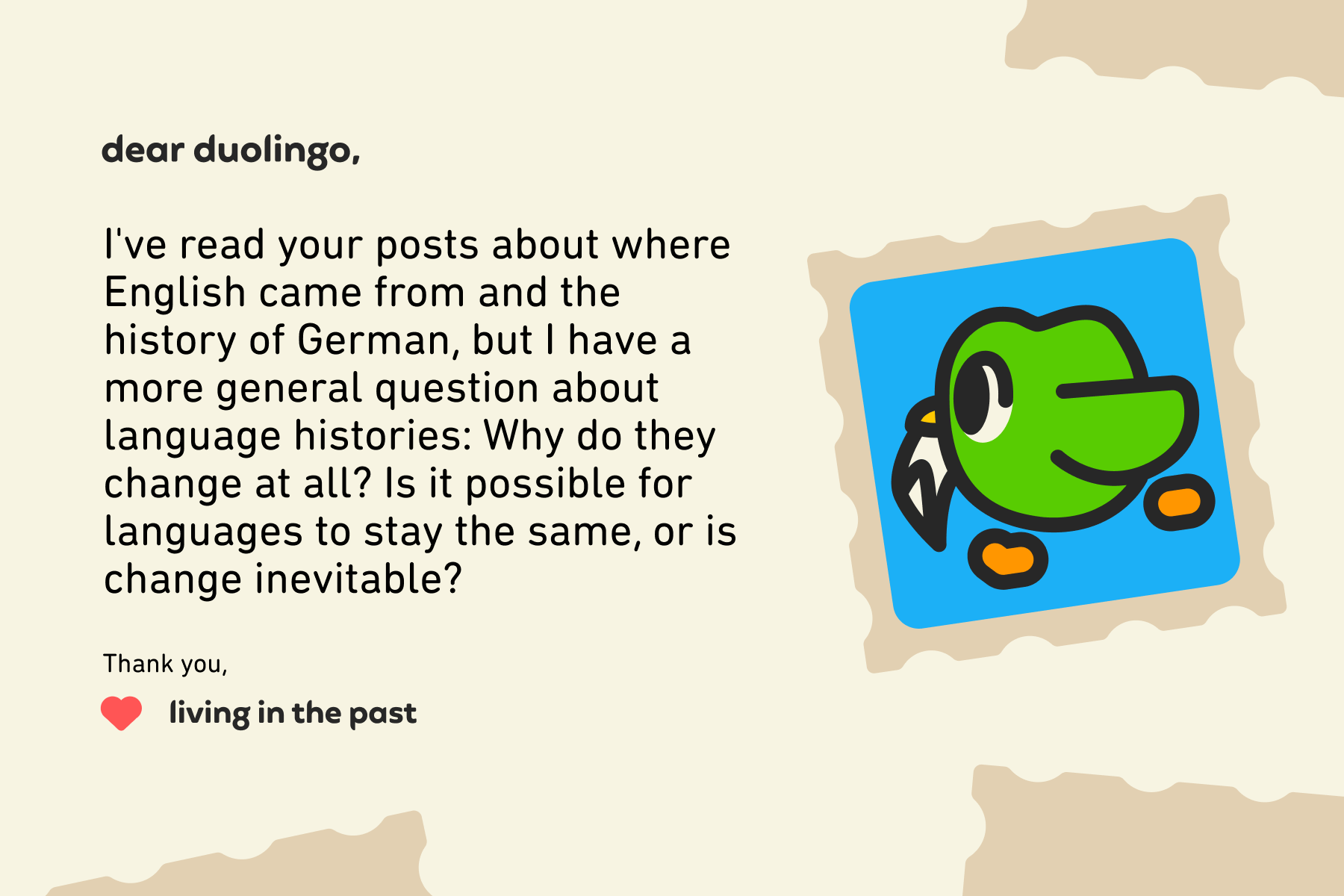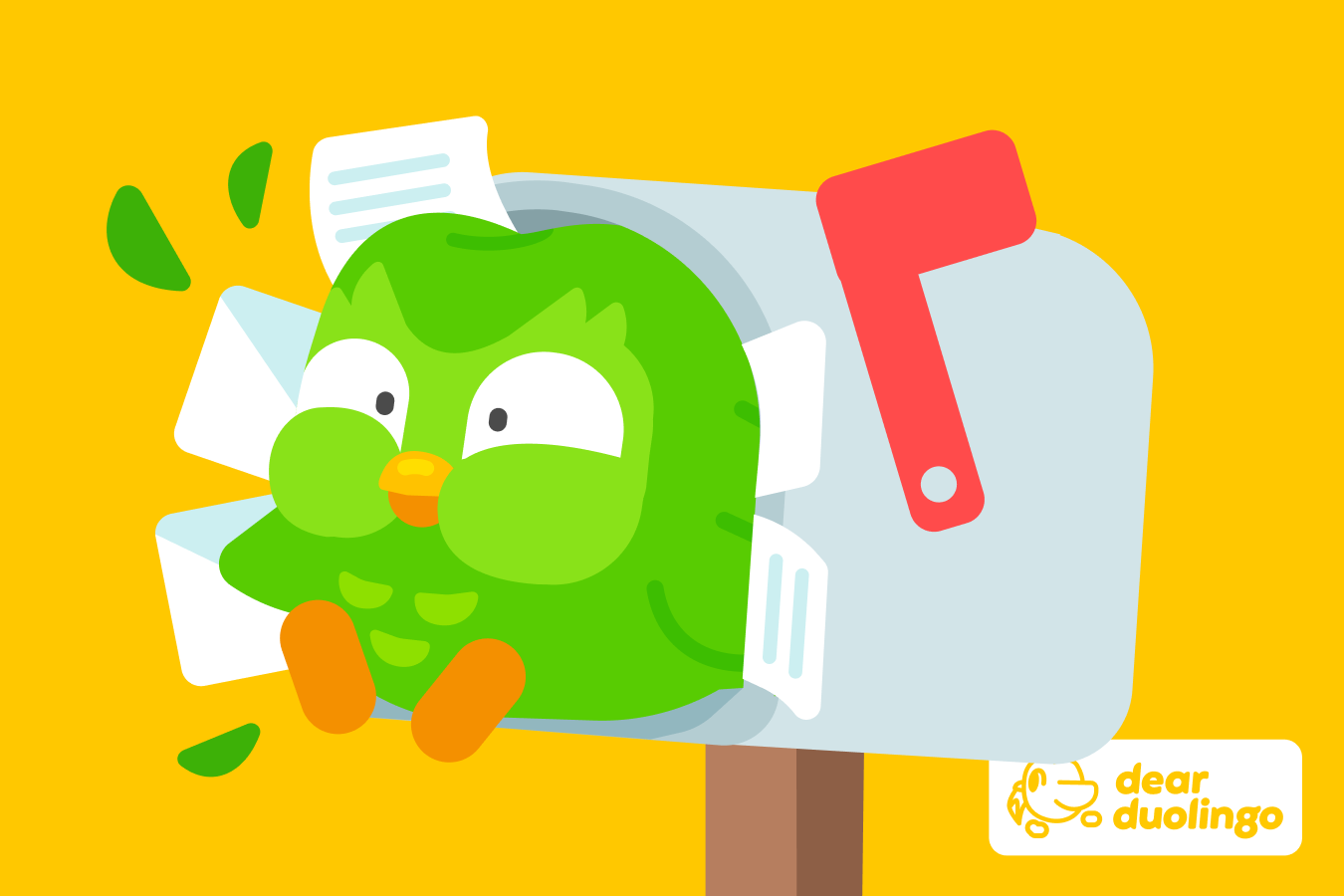Welcome to another week of Dear Duolingo, an advice column just for language learners. Catch up on past installments here.
Hi, learners! This week’s Dear Duolingo is a question about all languages, throughout all of time. 🌌 You might know part of the answer from a few other posts (like this one or this one), but do you know the whole story? Let’s take a look.
This week’s question:

Totally fair question, and one that has as much to do with language and linguistics as it does with culture, sociology, and politics. You might be familiar with how Latin evolved to give rise to many Romance languages, including Spanish and French, but… why? Why did they have to change at all?
There are many reasons why languages change, and I’ll cover a few of them, but also: We don’t entirely know why all changes happen! Sometimes changes are really well-documented over centuries—I’ll share a few English examples—but other changes, especially pronunciation changes, are less well understood. It’s easy to reflect on changes that have already happened, but basically impossible to predict what will change in the future.
So here’s some of what we do know about why languages change over time!
Our needs are always changing
One reason languages change is because we are constantly developing new things to talk about, so we need to create new words, expressions, and grammar to communicate about the new topics. We very often do this by repurposing existing words. Here are a few examples of words that were created or repurposed when a new need arose:
- Computer. For centuries, this word existed in English to refer to people who made mathematical computations: Just like a “teacher” is a person who teaches, a “computer” was a person who computes! By the end of the 19th century, it was used for the early machines that could also do computations, and throughout the 20th century it was used for a variety of devices and computing machines—the predecessors to the “computers” of today!
- Movie. When this new form of entertainment first emerged in the late 1800s, one of the names for the films was “moving pictures”—an easy way to describe them if you had never seen one. It took only a decade or so before the shortened version “movie” gained popularity.
- Friend. Making friends isn’t new, but about 20 years ago, we suddenly needed a new way to distinguish making a friend in real life (excuse me, “irl”) from creating a virtual connection on a social platform, especially Facebook. English speakers repurposed the noun “friend” into a verb for this special kind of friend-making, when you “friend” someone on social media!
Words don’t have single, stable meanings
Even at a single moment in time, there is variation in what a word means—even when we’re talking about how just one person uses the word. Any one word is (almost) always used in different kinds of sentences, alongside different kinds of words, with slightly different meanings. (And if a word is no longer in general use, across many contexts? Then it’s called a fossil.)
Think of the word “tall.” The height of a “tall” building is different from a “tall” kindergartener, and those are both different from a “tall” order (a metaphorical use of the word). Sometimes change happens when one meaning of a word becomes more common, and the other meanings fall out of use. This happened with “meat,” which used to mean food in general, including plants, grains, animal products, etc. Today, of course, “meat” means only food from animals or even food from land animals (and not from sea animals or birds).
Dialects can lead to additional changes
If just one person uses words in a whole range of ways, imagine all the additional uses, nuances, and phrases when we think about a whole community of people! We end up using language in ways similar to the people around us, those that we communicate with the most—so people who interact less will develop differences in how they use words, grammar, and pronunciation. That’s how dialects and accents develop, like a game of “Telephone”!
For example, in the 1600s, the French word apartment was adopted into British English to refer to a certain kind of housing situation. This word made its way to North America via English colonists—but in the meantime, the Scottish word flat (for a different sort of housing) grew in popularity in the U.K. Eventually, “apartment” stopped being the standard word in the U.K., in favor of “flat,” but by then “apartment” was already the common term in the U.S. Something similar happened with “soccer” and “football,” too!
We use language to represent our cultures and identities
Another reason languages change over time is because we use language to build our identities within a community and to differentiate ourselves from other communities. How we use language says something about where we’re from, our age, our gender, our education, who we associate with, and much more. Sounding different from one group can be as important as sounding the same as another!
One way our culture and identity can impact language change is through generational differences. The phrases and meanings that older people use can feel different, dated, or less relevant to younger people, so using language differently from your parents or grandparents can be desirable! These generational differences are often apparent when it comes to slang (think of words you use for “cool” compared to your parents’ words), but it’s true of other kinds of words as well: “television” can feel formal and long-winded if you’ve grown up around “TVs” your whole life.
When people move, they take their languages with them
The changes discussed above happen even when we’re talking about one language and even one community—and adding new communities and languages to the mix naturally introduces even more opportunities for change!
Sometimes communities (and their languages) come into contact with each other for reasons of trade or conquest (among many other causes), and these language contact situations can be short-lived or last centuries. The result could be that one community borrows words from the other—that’s how English got “pajamas” from Hindi—but some kinds of contact situations lead to the creation of entirely new languages, especially if people from different language backgrounds are forced together. This was the case for pidgin and creole languages, including Haitian Creole!
Continued contact between language communities can also lead to multilingualism among those groups, and some related changes, like codeswitching. This language mixing is called “Spanglish” when it happens with English and Spanish, and you can hear lots of examples of it in Bad Bunny’s music, because English and Spanish are used together in Puerto Rico!
What about laws and policies?
This isn’t a comprehensive list of all the reasons and ways languages can change over time, but it’s no coincidence that I didn’t mention laws or governing bodies. Some languages have official organizations that charge themselves with the responsibility of keeping a language “pure,” and so you might hear about the Real Academia Española having specific opinions about what counts as Spanish or not. The same is true for the Académie française for French.
These groups often prescribe what is ok or not ok to say in a language, but those decisions typically reflect the preferences and ideologies of those in power. Once a change is in progress, and a community is using a new word, phrase, or pronunciation because it helps them communicate, it’s very difficult to stop the natural process of language change! (Which is to say, vive le weekend !)
The more things change, the more they stay the same
Language change is unstoppable, and I wouldn’t want to keep it from evolving anyway! Since language is a communication tool, it only works when it serves a community’s needs—so just as our culture continues to change over time, so does how we communicate.
To learn more of the reasons why languages change over time, write to us at dearduolingo@duolingo.com.
